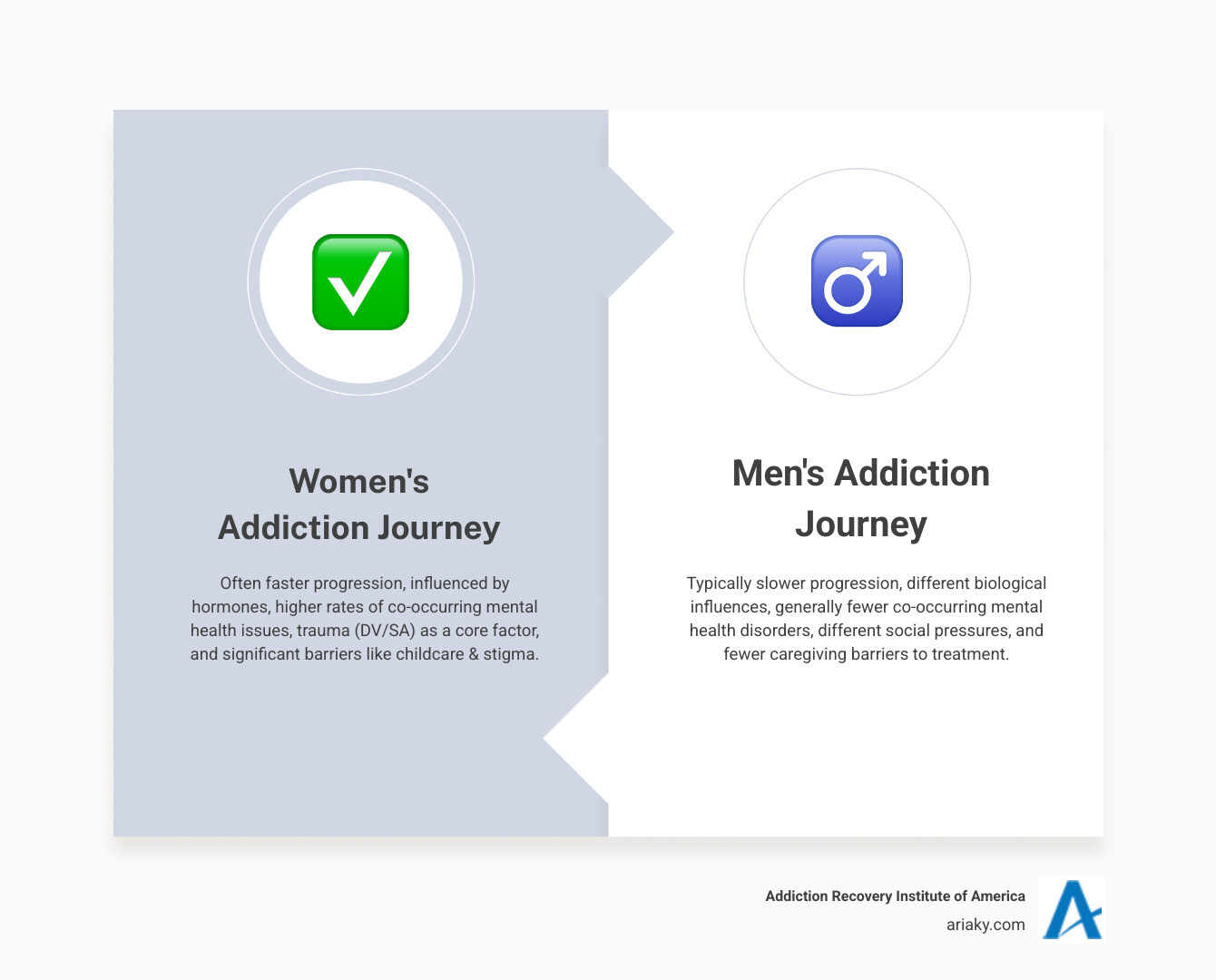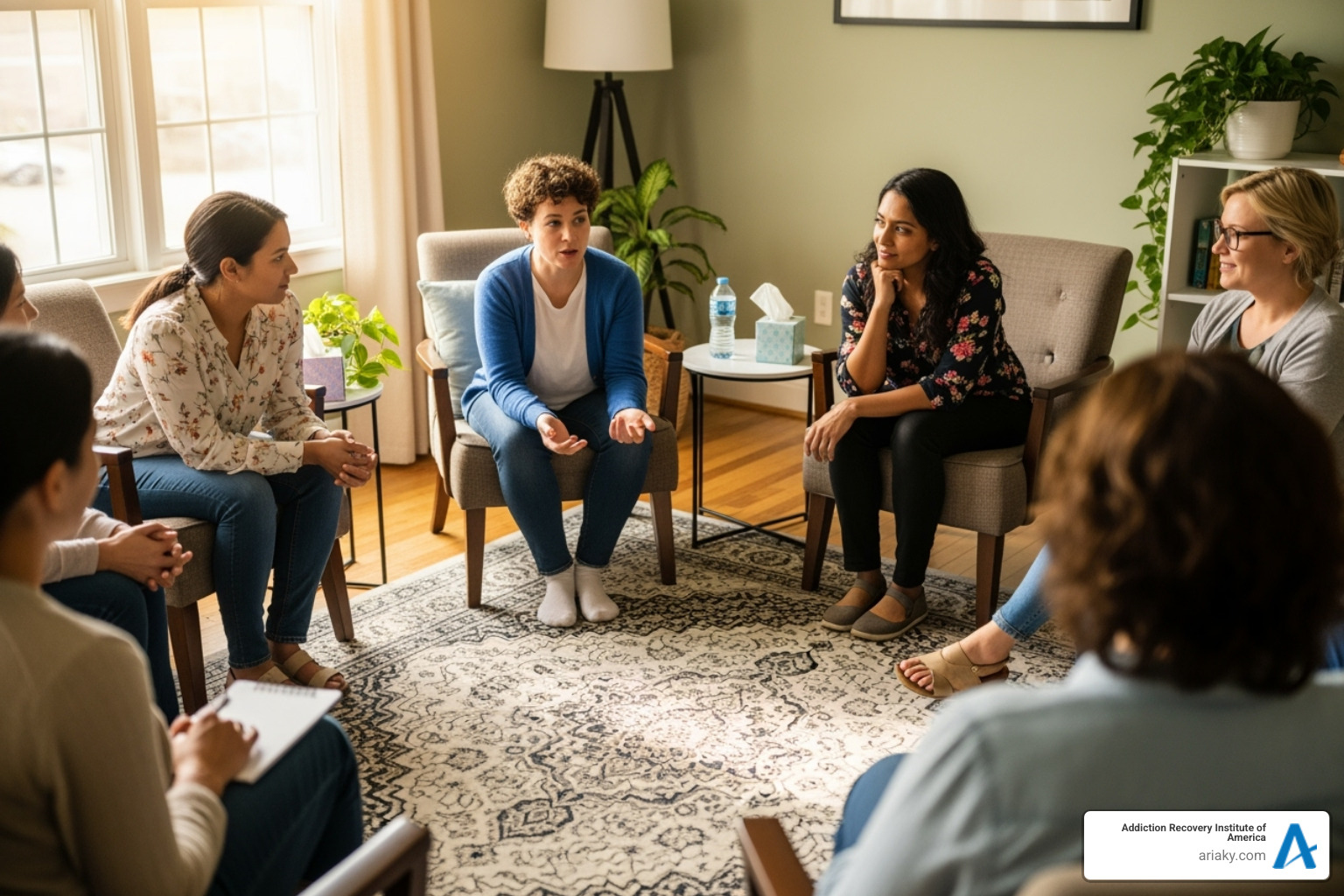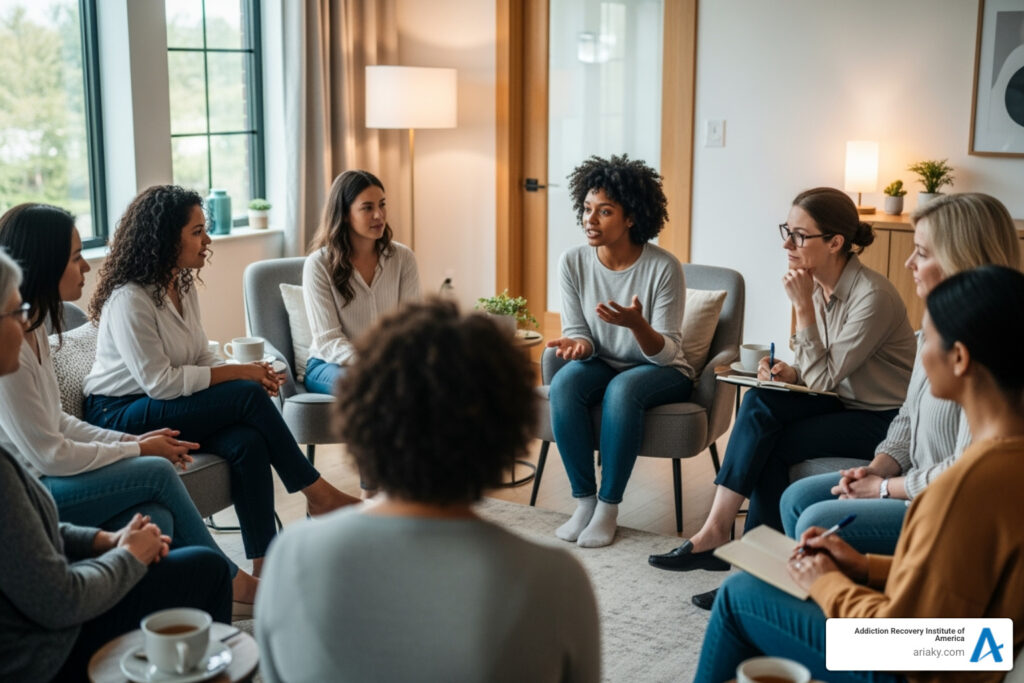Why Women Need Their Own Path to Recovery
Rehab for women provides specialized addiction treatment designed to address the unique biological, psychological, and social challenges women face in recovery. Unlike co-ed programs, women-focused centers create safe spaces where clients can openly discuss trauma, family, and gender-specific issues without judgment.
Key features of women’s rehab programs include:
- Gender-specific therapy groups and counseling
- Trauma-informed care addressing domestic violence and sexual assault
- Support for pregnant and parenting women
- Treatment for co-occurring mental health disorders like anxiety and depression
- Holistic approaches including yoga, meditation, and art therapy
- Safe, judgment-free environments that encourage open communication
Research shows women experience addiction differently than men, often developing substance use disorders faster and facing greater health consequences. They are also more likely to use substances to cope with emotional pain or trauma.
Women also face unique barriers to treatment, from childcare responsibilities to societal stigma. Studies show that women are more likely to experience shame when seeking help, making gender-specific programs essential for creating comfortable healing environments.
Evidence strongly supports women-only treatment. Experts note these programs demonstrate greater effectiveness for addressing specific problems related to women with addiction and show better outcomes for staying in treatment and reducing post-treatment drug use.

Why Her Journey is Different: Unique Challenges in Women’s Addiction and Recovery
Every woman’s path to recovery is unique, but women face distinct challenges compared to men. Understanding these differences is essential for effective treatment.
Statistics show that while women may start using substances later, they often develop addiction much faster. This “telescoping effect” means addiction can take hold with less exposure to drugs or alcohol.
Biological differences, like hormonal fluctuations and metabolism, cause women’s bodies to process substances differently. This affects addiction speed, withdrawal, and recovery timelines, creating unique addiction recovery challenges.
Societal pressures add complexity. Women often juggle roles as professionals, partners, and caregivers, making it feel impossible to admit they need help. Motherhood creates unique barriers, such as fear of losing custody or lack of childcare, which often delay women from seeking treatment.
The stigma and shame surrounding addiction are often more intense for women, especially mothers, creating a barrier to getting help.

The Critical Link Between Trauma, Mental Health, and Substance Use
A vast majority of women in addiction treatment have experienced trauma, such as domestic violence, sexual assault, or childhood abuse. Substances often become a way to cope with the pain of PTSD, anxiety, or depression. This creates co-occurring disorders, where addiction and mental health issues are intertwined.
Effective rehab for women must address both issues at once. Our trauma related addiction program KY is designed to heal the whole person. Women are more likely to use substances as coping mechanisms for emotional pain, which is why understanding mental health disorders and their link to addiction is crucial.
Societal and Relational Pressures
Women often carry heavy burdens from societal and relational pressures.
- Caregiver roles are often 24/7 responsibilities that leave little time for self-care or recovery.
- Relationship dynamics, such as financial dependence or enabling partners, can make it difficult for women to seek help.
- The pressure to maintain a work-life balance, especially for single mothers, can feel crushing while dealing with addiction.
- Body image issues and eating disorders are more common among women, with substances often used to cope with societal pressures about appearance.
- Abuse in relationships adds trauma that complicates recovery, as many women are conditioned to prioritize others’ needs.
Recognizing these challenges is the first step. Rehab for women that understands these complexities provides the specialized care needed for lasting recovery by addressing the whole person.
The Power of a Woman-Centered Approach: Benefits of Gender-Specific Treatment
Rehab for women offers a unique space for healing, free from the barriers and distractions of traditional co-ed programs. It’s about creating an environment focused entirely on recovery, where women’s unique struggles are understood.
| Factor | Women-Only Rehab | Co-ed Rehab |
|---|---|---|
| Safety | Improved physical and emotional safety, free from potential distractions or harassment. | May present distractions or discomfort for women, especially those with trauma histories. |
| Focus | Custom discussions on women’s issues (trauma, motherhood, relationships, body image). | Discussions may be broader, potentially overlooking specific gender-related concerns. |
| Peer Support | Fosters deep bonds and sisterhood, allowing for open and vulnerable sharing. | Dynamics can be complicated by romantic interests or gender-based social anxieties. |
| Specialized Topics | Addresses pregnancy, postpartum, parenting, domestic violence, and eating disorders directly. | These topics might be covered generally, but often lack the depth or sensitivity of specialized programs. |
The safety and comfort of being surrounded by other women who share similar experiences creates a powerful foundation for healing. This environment fosters reduced distraction and open communication. The resulting peer connection is powerful, helping women build a supportive tribe. The validation from shared experiences creates bonds that can last a lifetime.

A Safe Haven for Healing and Honesty
In women-only treatment, freedom from gender dynamics allows women to heal without romantic distractions or fear of judgment. This judgment-free environment allows for open discussion on sensitive topics like sexual trauma, body image, and motherhood. Building trust and fostering sisterhood happen naturally, strengthening recovery for everyone involved.
This foundation helps women maintain their focus on recovery. Our Rehab For Women at ARIA Kentucky provides this exact healing environment.
Custom Care for Unique Needs
Women’s treatment focuses on addressing trauma directly with specialized care for experiences like sexual assault and domestic violence. Crucial pregnancy and postpartum support is available, integrating prenatal care and parenting skills training to help new mothers rebuild confidence.
Specialized counseling addresses issues common to women, like eating disorders and relationship patterns. This holistic Tag: Treatment approach is key to lasting recovery. Finally, a strengths-based approach helps women refind their resilience and capability, empowering them to see themselves as strong women reclaiming their lives, not victims of addiction.
What Does Rehab for Women Involve? Programs and Therapies
Stepping into rehab for women means entering a world designed for your healing. Effective programs combine evidence-based and holistic therapies into an individualized plan that honors your unique story. At ARIA Kentucky, our Kentucky Addiction Treatment Therapy Programs are crafted to meet each woman where she is, combining proven methods with compassionate care.
Our programs are equipped to treat addiction to various substances, including alcohol, opioids, cocaine, meth, benzodiazepines, and more. We know that behind every substance is a person who deserves healing. We offer various options, understanding that women often juggle many responsibilities. Learning about Inpatient vs Outpatient care can help you choose the right path.
Levels of Care Custom for Her
Addiction treatment offers a continuum of care, providing the right level of support at each stage of your recovery.
- Medical detox is often the first step. Our Alcohol Detox Program KY and Opioid Detox Program provide safe, medically supervised withdrawal management.
- Residential treatment offers a sanctuary for healing. Our Residential Treatment Program KY provides 24-hour care in a drug-free environment, allowing you to focus completely on recovery.
- Partial Hospitalization Programs (PHP) provide intensive day treatment while you live at home or in sober living. Our PHP in Kentucky is ideal for those needing significant support without 24-hour care.
- Intensive Outpatient Programs (IOP) offer flexible yet substantial therapeutic support. Our IOP in Kentucky allows you to continue with work or family responsibilities during treatment.
- Traditional outpatient and aftercare planning provide ongoing support and community connections to help you maintain long-term sobriety.
Therapeutic Approaches Proven Effective for Women
The heart of rehab for women is its therapeutic approach. We use treatments proven to be effective for women’s unique healing needs.
- Trauma-informed therapy is our foundation. It creates a safe environment to process past experiences by asking “what happened to you?” instead of “what’s wrong with you?”
- Our Cognitive Behavioral Therapy Program helps you identify and change negative thought patterns that lead to substance use, developing healthier coping skills.
- Our Dialectical Behavior Therapy Program teaches practical skills like emotional regulation, distress tolerance, and mindfulness to manage intense emotions.
- Motivational interviewing is a collaborative approach that helps you find your personal motivation for recovery, free from judgment.
- Holistic therapies treat the whole person. We use yoga, meditation, art therapy, journaling, and physical activities to reduce stress, provide creative outlets, and improve overall well-being.
- Both our Individual Therapy Program and group therapy are essential. Individual therapy offers a private space for deep work, while group therapy provides the healing power of shared experience.
Finding Your Path: How to Choose the Right Program and Build Support
Choosing the right rehab for women is a critical, personal decision. Finding the right fit can feel overwhelming, but you are not alone. When considering centers, look for key factors:
- Accreditation: Look for accreditation from bodies like CARF or The Joint Commission. ARIA Kentucky is an accredited, AODE-certified center, meeting the highest standards of care.
- Staff Qualifications: A diverse team of trained doctors, therapists, and counselors ensures you receive comprehensive, understanding support.
- Program Philosophy: Ensure the program is gender-specific, trauma-informed, and offers individualized care that feels right for you.
- Location: Whether you stay close to home or seek a new environment, we have multiple Tag: Rehab Center locations across Kentucky.
- Reviews and Testimonials: Hearing from past clients offers invaluable insight into a program’s effectiveness.

How to Find the Right Rehab for Women
Finding the right rehab for women is manageable. Start with online research using reputable directories. Contact centers directly; our team at Contact ARIA Kentucky is ready to answer your questions. Ask your healthcare provider for referrals, and come prepared with questions about therapy, aftercare, and family involvement.
We accept self-referrals, which involve a brief assessment to determine the best level of care. If possible, take a campus tour to see if the environment is a good fit. Explore our Rehab Centers in Kentucky to see our facilities.
Navigating Financial and Accessibility Concerns
Financial worries are a common barrier, but many options are available. Financial barriers shouldn’t stop you. We offer Insurance Verification and accept major plans like Aetna and Blue Cross Blue Shield. Visit our Paying for Treatment page for more information.
Don’t be discouraged by waitlists; inquire about times and explore all options. For mothers, childcare is a major concern, and some programs offer on-site care or can connect you with resources. If transportation or housing instability are challenges, many facilities can offer support. Discuss these concerns openly with providers.
The Role of Family and Community in Long-Term Recovery
Recovery is not a solo journey; a strong support system is essential for lasting sobriety. Family involvement is transformative. Our Family Therapy Program KY helps heal relationships and educate loved ones, turning them into powerful allies.
Building a sober support network is key. This includes peers from treatment, mutual support groups (like AA or NA), and finding a sponsor. Alumnae programs provide ongoing support from peers who understand your experience. Community involvement, like volunteering, helps reduce isolation and builds a fulfilling life in recovery. This network provides the encouragement and accountability needed for long-term success.
Frequently Asked Questions about Rehab for Women
Considering rehab for women brings up many questions. Here are answers to some of the most common ones to help you feel informed and confident.
How long does a women’s rehab program typically last?
The length of a rehab for women program varies based on individual needs. Common options include 30, 60, or 90-day programs, but longer stays can be beneficial. Research shows that longer treatment generally leads to better outcomes. Treatment is custom to your individual needs, and you will progress through a continuum of care with strong aftercare support. The time you invest in treatment is an investment in your future.
Can I get help if I am pregnant?
Yes. Seeking help while pregnant is a courageous step for you and your baby. Many rehab for women programs offer specialized services for pregnant and postpartum women. These programs offer compassionate, non-judgmental care focused on the safety of both mother and baby. They often include integrated prenatal care and medical monitoring. Postpartum support is also crucial, helping to strengthen the mother-baby bond and providing parenting skills.
What should I bring with me to a residential program?
Packing for residential treatment is straightforward. The facility will provide a detailed list, but here are some general items to expect:
- Comfortable clothing for 7-10 days (laundry is available).
- Personal hygiene items (check with the facility about any restrictions on alcohol-based products).
- Your prescribed medications in their original bottles, along with a current list of all medications and dosages.
- Your identification, insurance card, and a journal or notebook for therapy.
The facility will provide a full list to ensure you have everything you need for a comfortable stay.
Begin Your Journey to Wholeness and Hope
Recovery is more than sobriety—it’s about reclaiming your life and building a future filled with hope. For women, this journey requires specialized care and a supportive community.
You are not alone. Thousands of women have found empowerment and wholeness through recovery. Specialized rehab for women is a pathway to lasting change. The difference is care that recognizes your unique journey as a woman, addressing trauma, motherhood, and societal pressures with specialized attention.
At Addiction Recovery Institute of America (ARIA Kentucky), we help women find their inner strength and build lasting sobriety. Our programs are designed to help you create a new start.
While the path may seem uncertain, taking the first step is the most important part. Our compassionate team is ready to walk alongside you, offering evidence-based, trauma-informed care to make real healing possible.
Your recovery story is waiting to be written. It starts with the courageous decision to reach out for help.
Ready to begin? Contact us to learn more about our Women’s Rehab Program in Kentucky and take the first step toward a life of wholeness and hope.

